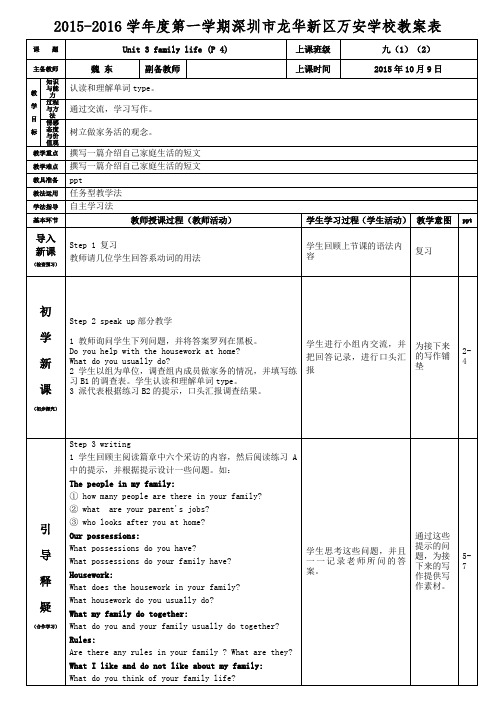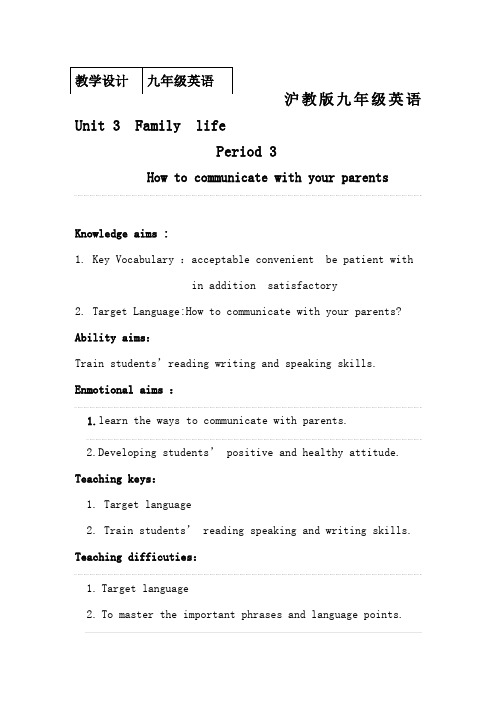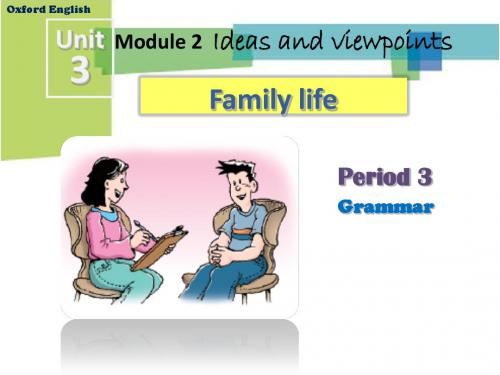沪教版九年级(初三)英语上册Unit 3 Family life(Period 4)_课件1
沪教版牛津英语九年级上unit 3 Family life(P 4)魏东

2015-2016学年度第一学期深圳市龙华新区万安学校教案表课题Unit 3 family life (P 4) 上课班级九(1)(2)主备教师魏东副备教师上课时间2015年10月9日教学目标知识与能力认读和理解单词type。
过程与方法通过交流,学习写作。
情感态度与价值观树立做家务活的观念。
教学重点撰写一篇介绍自己家庭生活的短文教学难点撰写一篇介绍自己家庭生活的短文教具准备ppt教法运用任务型教学法学法指导自主学习法基本环节教师授课过程(教师活动)学生学习过程(学生活动)教学意图ppt导入新课(检查预习)Step 1 复习教师请几位学生回答系动词的用法学生回顾上节课的语法内容复习初学新课(初步探究)Step 2 speak up部分教学1 教师询问学生下列问题,并将答案罗列在黑板。
Do you help with the housework at home?What do you usually do?2 学生以组为单位,调查组内成员做家务的情况,并填写练习B1的调查表。
学生认读和理解单词type。
3 派代表根据练习B2的提示,口头汇报调查结果。
学生进行小组内交流,并把回答记录,进行口头汇报为接下来的写作铺垫2-4引导释疑(合作学习)Step 3 writing1 学生回顾主阅读篇章中六个采访的内容,然后阅读练习A中的提示,并根据提示设计一些问题。
如:The people in my family:① how many people are there in your family?② what are your parent's jobs?③ who looks after you at home?Our possessions:What possessions do you have?What possessions do your family have?Housework:What does the housework in your family?What housework do you usually do?What my family do together:What do you and your family usually do together?Rules:Are there any rules in your family ? What are they?What I like and do not like about my family:What do you think of your family life?学生思考这些问题,并且一一记录老师所问的答案。
英语九上《Unit 3 Family life Reading: Family life in cities》_0

B.How many people are there in Jerry’s family?
C.Does Jerry have a lot of possessions?
Does Jerry do housework?
Task 2. Scanning
Work in pairs.
1. Know how to describe your family life .
2. Use reading skills to read the passage.
Emotions:
Strengthen students’ confidence in learning English.
三、学习者特征分析
3.Translate the following phrases into Chinese.
have no interest in______
help with__________
Look after __________
unless __________
although __________
Task4. Explain the key words.
1.本届初三学生英语基础较差,单独完成任务的能力较弱。所以在教学中,教师的引导显得更为重要,语速要慢,必要时候需要汉语翻译。
2.学生的基础较差,但学习的积极性不小,所以教师要从简单问题入手,使得他们在学习中有了成就感,这样更利于他们进步。
四、教学策略选择与设计
本节课的主要学习任务是阅读。各组分配学习任务,学生通过小组活动,把要讲述的内容明确,具体化,并把学习任务分配给本组的各成员,各成员在课堂上进行汇报,总结,从而完成学习任务。教师在课前充当指导者,帮助学生备课,在课上只是监督者和服务者。
沪教牛津版-英语-九年级上册3单元 Family life P2 Listening课件

Pay attention to every detail in the dialogue as you listen because the question could be based on any piece of information you hear.
1
Listen to the conversation between family members. Then circle the correct answers to the questions you hear. (P 38)
a.Байду номын сангаасevin. b.Anthony.
c. Peter. d. Gary
这场闹剧是由一条能动
You can lo的ok怪f裤or子th和e 一wh只o邪le 恶sto的ry企鹅 企f鹅ro其m实th是e一I引n个t起e坏r的n蛋e。t,aW他ftae阴lrla谋cclea策的ss划来. 妄访图者
将不知情的Wallace拉下水,而Wallace的 新发明机器裤子成了企鹅盗取钻石珠宝 的工具。坏人的阴谋当然不会得逞……
questions you hear. (P 38) Times
Thursday 7 p.m.
Friday
5 p.m. and 8 p.m.
Saturday zX.x.K
Sunday
5 p.m. and 8 p.m. 7 p.m.
a. The one at 7 p.m. on Thursday. b. The one at 8 p.m. on Friday. c. The one at 5 p.m. on Saturday. d. The one at 7 p.m. on Sunday.
九上Unit3FamilyLife知识点

九年级上册Unit 3 Family Life重要知识点讲解一、重点短语1.on business 出差2.have no interest in...对...没有兴趣3.out of dat=out of fashion过时的4.for example=such as例如5.give sb a hand=help sb帮助某人6.be patient with sb对某人有耐心的7.find out 查清,弄明白municate with sb和某人交流9.have to do sth必须做某事10.except sb to do sth指望某人做某事二、重点语法1. 【辨析】because, since, as, for 因为语气由强至弱依次because since as for1)because, 回答why的提问,表示直接原因2)since表示显然的或已知的理由3)as 鉴于说明原因,主句说明结果4)for 接句子不能放句首,表推断。
e.g.1. They hurried on because it was getting dark.2. Since you can't answer it, perhaps we'd better ask another.3. As I had a cold, I was absent from school.4. He is honest, for he is loved by all.2.This idea seems to make sense.make sense意为:有道理,有意义,讲得通。
This sentence doesn’t make sense.It all started make sense. 这一切都开始变得有意义。
3. It's much bigger than our last one.much 可修饰比较级,类似的词还有a little, a bit, far,even等。
英语九年级上册《Unit 3 Family life More Practice: How to communicate with your parents》_3

教学设计 九年级英语沪教版九年级英语Unit 3 Family lifePeriod 3How to communicate with your parentsKnowledge aims : 1. Key Vocabulary :acceptable convenient be patient within addition satisfactory 2. Target Language:How to communicate with your parents? Ability aims: Train students’reading writing and speaking skills. Enmotional aims :1.learn the ways to communicate with parents.2.Developing students’ positive and healthy attitude. Teaching keys:1. Target language 2. Train students’ reading speaking and writing skills. Teaching difficuties:1. Target language 2. To master the important phrases and language points.Teaching procedure : Step I Presentation 1.lead in Use DongQing to lead in the topic.Because DongQing is very popular with people,especially among teenagers.And she had the same problems when she was young.After communicating with her father ,she understood her parents.choosing DongQing as an example is a good way to lead in the topic,communicating is very important.” 2.Thinking and discussing Give students two questions to think to lead municating is very important,but how to communicate with your parents? (1).Are there any disagreements between you and your parents? (2).What do you usually do when you have disagreements with your parents? Maybe it is difficult for students to express their ideas.Solead in the reading. 3.While reading (1) Extensive reading Ask students to read the passage with the following questions and master the main idea. 1. How many tips are there in this passage?2. What must you be ready to do if you want your parents tochange?3. Why might your parents understand your situation better thanyou expect?4. What is part of growing up?From this part,students may master the mian idea,but it isnecessary for them to know some key words and phrases.(2) Intensive readingThis time ask students to read this passage again and find outthe words which are shown on the blackboard.1 have trouble2 solve v3 acceptable adj4 both...and...5 convenient adj6 patientadj7 in addition8 satisfactory adj9 talk withfind out10 communicategrow upa. After reading explain these key words to students.1. have trouble (in) doing sth2. both...and... either...or... neither...nor...3. be patient with... 4. satisfy v be satisfied with...satisfactory adjb. Finally ask them to retell this passage with their own words and ideas.they can use these words to help.After extensive reading and intensive reading ,students must understand the passage well. Step III Practice In order to make sure they can master the keys well.Give them these exercises to do. 中考链接 1.她在解决这个问题上遇到了困难,我们应该去帮帮她。
沪教版牛津英语九年级上unit 3 Family life(P 3)魏东

Х√ √Х√ХOur family lives I
are am
different. a good daughter.
He
They
is
were
busy with his work.
happy to see each other.
• We use adjectives after the linking verb be (am/is/are/was/were) to say what somebody or something is like. • We use different forms of the verb be to match with different personal pronouns.
• Our family lives are different. adj. • You look tired. adj. • He became a doctor. n
.
1. We are having a picnic. 2. His face turned red. 3. The weather got hotter and hotter. 4. We are helped by them. 5. The coffee smells good. 6. The boy was sleeping.
Complete the speech bubbles in the cartoon below with the correct forms of the linking verbs and the adjectives from the boxes.
Linking verbs followed by nouns or noun phrases
英语九上《Unit 3 Family life Writing: My family life》_1
3.Train students cooperation skills and improve their expression skills.
4.Enhance their self-confidence.
3.Finish a schedule of survey
1.Read the article which isrelated to the writing topic and answer the questions
2.Study the structure of the text
3.Observe and summarize the structure-s of your friends some questions about their family life and finish the table. Then report it.
1.To improve the readingability and To lead students to think and summarize the main idea of each paragraph.
Language and structure learned just now.
Write their own compositionon EKwing
Train Ss writing and languageorganization skills.
EKwing
Step5:Post-writing
Look at the remarks of EKwing and correct the mistakes.
最新沪教版初中英语九年级上册精品教案 Unit 3 Family life Period 6
Language and structure learned just now.
⑥. Teach them how to evaluate a writing.
2.Revise the text and make students know how to write the article better..
3.To practice their ability of language organization and the structure of the writing.
4.To train the students’ cooperation ability.
5
25
第三环节 课堂练习
StepⅣ:SHOW TIME
教学环节
主要教学步骤或内容
学生主体活动
教师活动
设计意图
时间
分配
第一环节 复习回顾平移的基本性质,引入课题
StepⅠ:Lead in
Reading comprehension.
1. Read the article which is related to the writing topic and answer the questions.
d. what your family do together
e.rules
f. what you like to do and do not like to do in your family.
④Ask students to study the structure of the text and the reading compression and summarize the structure of the writing
2024九年级英语上册Unit3FamilylifeReading上课课件沪教版
_e_v_e_n_t_s__ (planned public activities) together. 5. He can’t watch TV. He can’t go out with his friends
I love all my family very much. We have close relationship, and we always support each other.
careful reading
Task 1 Skimming for the common topics.
Family members Possessions Housework Family activities. Rules Likes most about the family
Look and answer.
1 What is Emily doing? She is watching TV.
2 Does she look happy? Find some evidence from the first interview to support your answer. No, she doesn’t.
daughter n. 女儿 mind v. 介意
fashionable adj. 流行的;时髦的 fashion n. 流行款式;时兴式样
out of date adj. 过时的 iron v. (用熨斗)熨;烫平
event n. 公开活动 suppose v. (根据所知)认为
either adv. (用于否定词组后)也 relationship n. 关系;联系
沪教版牛津英语九年级上unit 3 Family life(P 2)魏东
2015-2016学年度第一学期深圳市龙华新区万安学校教案表课题Unit 3 family life(P 2)上课班级九(1)(2)主备教师魏东副备教师上课时间2015年9月25日教学目标知识与能力1 能运用核心单词和短语表演采访。
2 能归纳Emily的家庭生活和Jerry的家庭生活的特点和不同。
过程与方法通过对比策略,归纳Emily的家庭生活和Jerry的家庭生活的不同。
情感态度与价值观了解和谐、健康的家庭生活方式。
教学重点归纳Emily的家庭生活和Jerry的家庭生活的特点和不同。
教学难点能运用对比策略,归纳Emily的家庭生活和Jerry的家庭生活的不同。
教具准备PPT教法运用任务型教学法学法指导自主学习法基本环节教师授课过程(教师活动)学生学习过程(学生活动)教学意图ppt导入新课(检查预习)Step 1 warm up全班齐读阅读文章。
全班朗读文章检查上节课所学初学新课(初步探究)Step 2 回顾文章1 要求学生完成vocabulary C2的练习2 学生两人一组,根据comprehension D1的问题和文章的内容,表演Paula对Emily和Jerry的采访。
学生完成词汇练习,并且表演文章中的采访。
检测学生运用新授词汇的能力2-3引导释疑(合作学习)Step 3 比较Emily和Jerry各自的家庭生活。
1 学生完成Comprehension D2的练习2 根据comprehension D2中表格的内容,完成下面的句子填空,归纳比较Emily和Jerry各自的家庭生活。
Jerry has ___________________ than Emily.Emily has __________________ than Jerry.Jerry __________ the housework, but Emily doesn’t.Jerry usually has ______________ with his familymembers, but Emily doesn’t.Jerry’s parents ____________________, but Emily’sparents don’t.Emily only likes ____________, while Jerry likes__________ of his family.3 学生再次阅读文章,然后运用句型——I'm …….Although……学生完成练习,根据表格归纳,并且尝试用自己的话总结Emily和Jerry各自的家庭生活进一步理解他们的家庭生活4-12基本环节教师授课过程(教师活动)学生学习过程(学生活动)教学意图ppt 拓展学习(深入探究)Step 4 模仿文章,谈论各自的家庭生活。
- 1、下载文档前请自行甄别文档内容的完整性,平台不提供额外的编辑、内容补充、找答案等附加服务。
- 2、"仅部分预览"的文档,不可在线预览部分如存在完整性等问题,可反馈申请退款(可完整预览的文档不适用该条件!)。
- 3、如文档侵犯您的权益,请联系客服反馈,我们会尽快为您处理(人工客服工作时间:9:00-18:30)。
Making rules and regulations
We can express the rules as dos (positive rules) and don'ts (negative rules). For example:
A Jerry's parents have set some rules for him. Read what Jerry's mother says and complete the rules.
When we refuse help, we can also use No, there's no need. No. Everything's OK. Thanks for asking, but everything's under control. No, don't worry.
Study skills
Discuss and answer the questions below.
• Do your parents make rules for you at home? Give some examples.
• Where else do we have rules and regulations?
A2 Answer these questions.
1 Tony offered to help Joyce three times. What did he say to offer help?
2
Joyce refused Tony's offers twice. What did she say to refuse his offers?
3
Joyce accepted Tony's third offer. What did she say to accept his offer?
When we offer help, we can also use Is there anything I can do (for you)?
We can also express the rules by using No + a gerund. For example:
*B Mr Li is the manager of Central Garden Shopping Centre. He wants to put some rules on the centre's notice board. Read his words and complete the rules.
Jenny: No, thanks. _____________________________________ I'm OK. Ann:
Oh, that would be good./Thanks a lot, but I can do it. Jenny: ______________________________________________
Is there anything you want/need? Shall I help you?
When we accept help, we can also use Oh yes, that would be nice/lovely/helpful.
Well, if you wouldn't mind … Well, now that you ask, you could …
Ann visits Jenny when she is doing housework, and Ann wants to help. Complete their conversation below.
Ann: Hello, Jenny. You look busy. ___________________________ Anything I can do to help?/What _________________________________________________ can I do for you?/Do you need any help? but I can manage Jenny: Thank you very much, _____________________________ . Ann: Let me give you a hand./Let me do something for you. Come on. _________________________________________ sweep the floor/clean the windows . If you want, I could ____________________lp
Read the conversation after the recording.
A1 Joyce is doing some housework at home. Tony offers to help. Practise their conversation in pairs.
Hello Joyce, you look busy. Anything I can do to help?
Come on. Let me give you a hand. If you want, I could wash the dishes.
Thanks, but I'm all right. No, thanks. I can manage. Wash the dishes? Oh, that would be good. Thanks a lot.
Unit 3 Family life
(Period 4)
Talk time Study skills
Talk time
Offering, accepting and refusing help Read the conversation below.
offering help
refusing help
